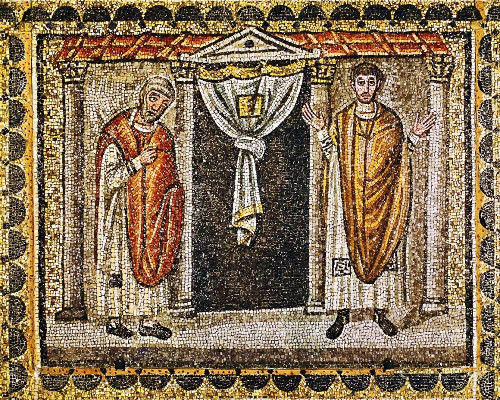Day 22 : 21 March
Hear our voice, O Lord, according to your faithful love.
Lectionary readings (Click the links to see the readings):
| Hosea 5.15-6.6 | Psalm 51.10-17 | Luke 18.9-14 |

The publican and the pharisee (Luke 18)
…Continuing from yesterday's reading …
Even though we are poor, weak, stupid sinners, we are the beloved children of God whom he celebrates (1 Jn. 3:2). We do not stand anymore in self-righteousness like the good boy who stayed home and did everything his father always wanted. No. We do not get crushed down by our stupid sinfulness, but we accept the reality that we are embraced with divine love. We are God's beloved sons and daughters! That's the thing to truly seek.
We should ask ourselves: How do I see myself as son and God as father and open myself to this conversion?
Then we will be ready for the epiphany of Easter, when we will truly know that we have been baptized into the risen Christ, that we are the beloved son or daughter who has the fullness of eternal life. We have overcome the sin of death.
Why do we hold back from this? Because we know it is going to cost. It is going to cost us to be profoundly humble. To know our true dignity to know God's fantastic love, and to know our poor, weak, stupid sinfulness is profoundly humbling. It utterly destroys any shred of dignity we try to build up with the false self. And it calls us forth to live as sons and daughters. That is why our father Benedict says, "The labor of our obedience will bring us back to him from whom we have drifted through the sloth of disobedience."
When we know our dignity, know who we truly are, know who God truly is, then there is something deep in us that cries out as did Jesus, I always do what is pleasing to him (Jn. 8:29). This means a real dying to self—all our self—will, all our own ideas, all our way of doing it. We know that, but we do not want to pay that price. The price we pay for not doing it is that we deprive ourselves of knowing who we truly are and of living in the glory and joy of being the beloved child of God. I tell you … that there is absolutely nothing in this world—nothing that I can possibly conceive of—that is more wonderful than this: to know that you are God's beloved child. It is total liberation. It's wondrous and great. It's a fulfillment of all the desires for love that you could possibly have. Love beyond your conceiving.
William of St. Thierry has a wonderful little treatise on prayer. He ends the last paragraph rather ironically:
If, however, we give way completely to laziness and sloth and out of the depths of our ignorance cry to God as out of a dungeon and if we want to be heard even when we are not seeking the Blessed face of Him to whom we cry, and if we do not care whether He is angry or appeased when He gives us what we want, as long as we get it. 'Well, a man who prays like that must be content with what God gives. He does not know how to ask God for a great thing so it is nothing great he receives.
Jesus says to us in the Gospel, Ask and it will be given to you; seek and you will find (Mt. 7.7). God will give us whatever we want, and William is saying, "You're pretty stupid to ask for anything less than God himself!" This epiphany and this manifestation is the experience of who we truly are as sons and daughters and, therefore, who truly God is as Father. This is the experience of reality. It is the experience that is completely transforming. It is the experience that Saint Benedict calls us to when he says we are to truly seek God. It is what our life is all about.
During this Lent, let us get more in touch with ourselves as we see ourselves as sons and daughters. Let that be re-formed by the way Jesus reveals son and daughter to us in the Gospels, and then father. Let this transformation open us to that experience when we let go of all our own ideas of how we are to return to the Father and let the Father totally embrace us, lift us up, and celebrate us as his beloved children.
W. A. Mozart. Requiem Mass in D Minor. XII - Communio (Lux Aeterna)
English Baroque Soloists and the Monteverdi Choir, cond. John Eliot Gardiner at Palau de la Musica Catalana, Barcelona, Dec. 1991.
| Lux aeterna luceat eis, Domine, cum sanctis tuis in aeternum, quia pius es. Requiem aeternum dona eis, Domine, et Lux perpetua luceat eis, cum Sanctus tuis in aeternum, quia pius es. | Let eternal light shine on them,Lord, as with Your saints in eternity, because You are merciful. Grant them eternal rest, Lord, and let perpetual light shine on them, as with Your saints in eternity, because You are merciful. |
May God our Redeemer show us compassion and love. Amen.